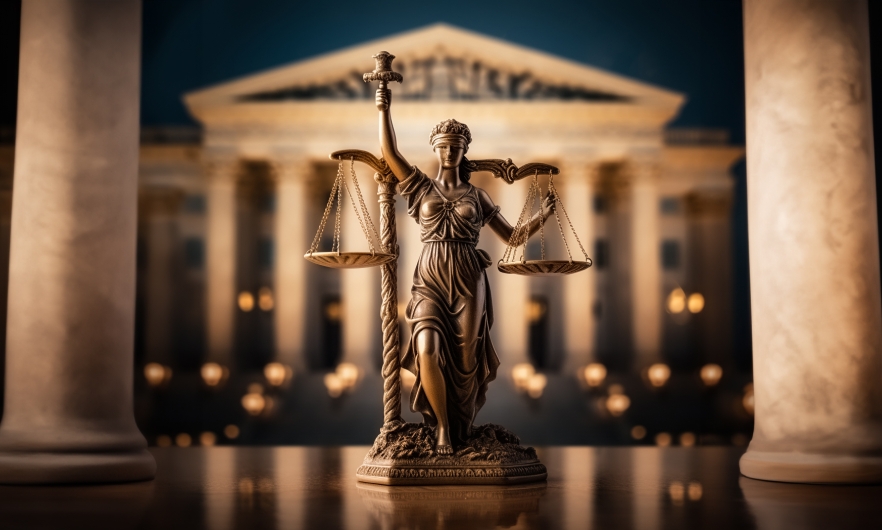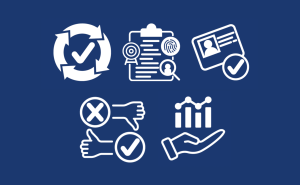In the Courts: Maryland Shall Issue v. Moore
Maryland defends Handgun Qualification License before the Fourth Circuit Court of Appeals.

On August 23, 2024, the en banc panel of the 4th Circuit issued its decision upholding the Handgun Qualification License law.
This article was updated August 23, 2024 to reflect new developments since the first version posted May 9, 2024.
Last year, a three-judge panel of the U.S. Court of Appeals for the Fourth Circuit found Maryland’s Handgun Qualification License (HQL) unconstitutional. An HQL is a form of firearm purchaser licensing that requires would-be handgun purchasers to apply for and receive a license. The two-judge majority ruling stated that the HQL, while not a permanent ban, violated the Second Amendment because it prevented individuals from immediately obtaining a handgun. The State of Maryland successfully petitioned for the case to be heard by a panel of all active judges of the Fourth Circuit – a process known as a re-hearing en banc.
On March 21st, 16 judges of the Fourth Circuit in Richmond, Virginia heard oral arguments in Maryland Shall Issue v. Moore. On August 23, 2024, the en banc panel of the 4th Circuit issued its decision upholding the HQL law. The timeline below shows the long, winding road through the courts of suits, challenges, and Supreme Court decisions that have affected this case.
Who Is Involved?
Maryland Shall Issue: Gun owners’ rights non-profit organization.
Governor Wes Moore/State of Maryland and the HQL requirements included in the Firearm Safety Act of 2013.
What Are The Arguments?
While the court case relates to the challenge of the entirety of the purchaser licensing system in Maryland, the oral arguments focused almost exclusively on whether the Constitution allows for a wait of any length of time before an individual may take possession of a firearm.
Maryland Shall Issue asserted that the HQL, which currently allows the State up to 30 days to process an application, violates the Second Amendment.
The State and multiple judges on the panel noted that the Supreme Court seemed to bless shall-issue public carry licensing regimes, similar to Maryland’s HQL, except perhaps where wait times are too long. Arguing that the Bruen decision indicated that only law-abiding, responsible, adult citizens are covered by the Second Amendment, the state asserted that persons seeking to purchase a firearm must show that they are among that group by completing the HQL process. Additionally, the State asserted that courts have recognized a historical tradition of regulating firearms by dangerous persons. According to the state, the requirements put in place by the HQL, including fingerprinting, a thorough background check, and firearm safety training, ensure that the individual is of legal age, a resident of the state, not prohibited from possessing a firearm, and will be a responsible gun owner.
What’s Next?
On August 23, 2024, the en banc 4th Circuit issued a 14-2 decision upholding Maryland’s HQL law against the Second Amendment challenge. Judge Keenan writing for the majority, joined by 9 other judges of the 4th Circuit, relied on language in New York State Rifle and Pistol Association v. Bruen that appeared to bless shall-issue public carrying licensing regimes and determined that Maryland’s HQL was one such shall-issue licensing law. The majority rejected the challenger's assertion that the “relatively brief application, review, and approval process of the HQL statute” was unconstitutionally lengthy. Four judges agreed with the ultimate outcome of the case but disagreed with the reasoning and either authored concurring opinions or joined concurring opinions. Only two judges dissented and would have found the law unconstitutional.
For an in-depth discussion with our legal team, tune in to our podcast: Sufficiently Analogous. Although recorded before the en banc decision, the first episode provides an overview of the 3-judge panel opinion, reactions to oral arguments and takes a deep dive into the research on firearm purchaser licensing and historical analogues for firearm purchaser licensing.
Listen to The Podcast
Background Timeline:
2008: DC v. Heller, the Supreme Court decision recognizes that the Second Amendment protects the right to possess an operable handgun in the home for the purpose of self-defense.
2013: Maryland’s Firearm Safety Act of 2013 becomes law, including standards for obtaining a Handgun Qualification License (HQL) (fingerprinting, background check, firearm safety training including live fire)
2016: Maryland Shall Issue, Atlantic Guns, and individual members of Maryland Shall Issue are plaintiffs in a suit challenging the HQL law.
2019: Maryland District Court finds the plaintiffs lack standing to challenge the HQL law.
2020: 4th Circuit determines Atlantic Guns has standing based on the reduction in handgun sales since the law's passage. The case is remanded to the district court.
2021: Maryland District Court determines the HQL satisfied immediate scrutiny as it was substantially related to achieving public safety.
2022: New York State Rifle & Pistol Association v. Bruen, the Supreme Court strikes down New York law requiring “proper cause” must be demonstrated to have the right to carry a handgun in public and established a new test focused on history for evaluating Second Amendment cases.
Read more about the Bruen decision
2023: A three judge panel of the 4th Circuit Court finds that Maryland’s HQL law violated the Second Amendment. The state of Maryland petitions for the 4th Circuit to re-hear the case en banc.
2024: Full 4th Circuit Court panel hears arguments in Maryland Shall Issue v. Moore and issues its decision upholding the law.
Terminology Glossary:
Concurring Opinion: an opinion in which a judge or several judges agree with the outcome of the case but disagrees with the reasoning or wishes to make an additional point not supported by the majority.
En Banc: All active judges of the Circuit Court of Appeals hear a case that is especially complex or important, rather than a three-judge panel, which often issues rulings.
Firearm Safety Act of 2013: Maryland law that includes an assault weapon ban as well as the requirements for the Handgun Qualification License.
HQL: Handgun Qualification License, Maryland’s process includes a fingerprint-based background check and firearm safety training that includes live fire.
May Issue: The state has discretion on whether to issue a concealed carry permit, regardless of whether an applicant fulfills the requirements.
MSP 77R: Maryland State Police Application and Affidavit to Purchase a Regulated Firearm (handguns and assault weapons).
Shall Issue: The state must issue a concealed carry permit to all applicants who meet the requirements for a concealed carry permit.
Standing: The capacity for some to bring a case, a justifiable argument, an actual controversy vs a hypothetical one.
The United States Court of Appeals for the Fourth Circuit: One of twelve regional appellate courts within the federal judicial system. The court hears appeals from the nine federal district courts in Maryland, Virginia, West Virginia, North Carolina, and South Carolina and from federal administrative agencies.




